“The Book That Changed America”
Air Date: Week of July 7, 2017
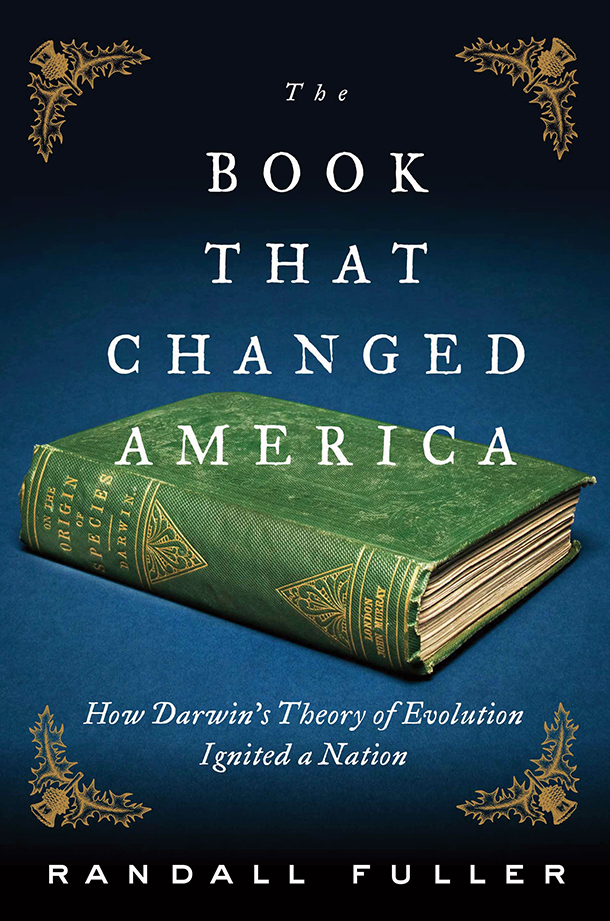
The Book That Changed America: How Darwin’s Theory of Evolution ignited a Nation. (Photo: Randall Fuller)
Is Charles Darwin’s On the Origin of Species, says Randall Fuller, Professor of English at the University of Tulsa. Darwin’s book arrived in Boston and Concord, Massachusetts in 1860, as the slavery debate raged and civil war loomed, and its ideas were instantly fodder for those discussions. Randall Fuller explains the influence of Darwin’s new theories on Thoreau and his contemporaries with Living on Earth’s Helen Palmer.
Transcript
CURWOOD: It’s Living on Earth, I’m Steve Curwood.
Henry David Thoreau was born into a century that changed scientific understanding, and society, and writer Randall Fuller argues that no single book was more influential than Charles Darwin’s “On the Origin of Species”. He calls it “The Book That Changed America”, and writes that, when it came out in 1859, the debate about slavery was raging and civil war loomed. Its revolutionary thesis challenged, excited, and infuriated the intellectual elite and Thoreau was an early believer.
Randall Fuller teaches English at the University of Tulsa, and he spoke with Living on Earth’s Helen Palmer.
PALMER: So Randall Fuller, you subtitle your book, “How Darwin’s Theory of Evolution Ignited a Nation”. When “On the Origin of Species” arrived in the New England, the slavery debate was already pretty red-hot. How did Darwin’s theories play into that debate?
FULLER: Well, you're right. The divisiveness over slavery was already bubbling over as a result of the John Brown affair, but what Darwin's book did was enter a cultural moment where questions of competition between regions and especially the relative status of black people versus white people was incredibly heated and contentious, and so, what Darwin did essentially was bring to an already very fractious and volatile moment a new take on an old discussion about racial ideology and slavery.
PALMER: Now you mention the John Brown affair. Can you tell me exactly what that was?
FULLER: In October of 1859, just as Darwin was finishing his book, John Brown led a small band of white and black rebels, as it were, to raid a federal armory in Virginia, in the hopes of releasing weapons to the slave population and fomenting a slave rebellion. The rebellion went horribly wrong. Brown was injured and imprisoned almost immediately. And in December 2nd, in a widely publicized trial, he was executed. And that trial galvanized American opinion about slavery. It intensified animosity throughout the two regions, the north and the south, and it occurred just as Darwin's book was arriving on these shores.
PALMER: Before we leave the issue of Harper’s Ferry, I'd like you to read a piece of your book, if you wouldn't mind. It's on page 220. I think one of the important things about this is that it's almost the thesis of the book.
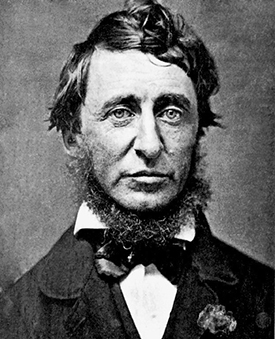
Daguerrotype of Henry David Thoreau in June 1856. (Photo: Benjamin D. Maxham, Wikimedia Commons public domain)
FULLER: Yeah, the argument here is that, if John Brown had not attempted his raid on Harper's Ferry, a whole sequence of domino effects might not have occurred, and likely Lincoln would not have won the election, and so Brown's raid is really a seminal moment in American history that led to Lincoln's election and also led after Lincoln's election to the dissolution of the Union.
PALMER: If you could read that, please.
FULLER: Lincoln's ascendance to the country's highest office was a direct result of Brown's attack on Harper's Ferry which had divided Democrats and left them without a viable candidate. During the summer of 1860, while debates over Darwin's theory reached their apex, America's pro-slavery press had vilified Lincoln, using his ungainly visage in countless cartoons. Lincoln was portrayed as a suitor of black women or as the missing link between blacks and whites. Sometimes he was even a gorilla -- Ape Lincoln.
After the election, the south immediately revolted. Former Democratic President James Buchanan addressed Congress to complain of ‘the long continued and intemperate interference of the northern people with the question of slavery in the southern states. The different sections of Union are now irate against each other, and the time has arrived, so much dreaded by the father of his country when hostile geographical parties have been formed.’ Buchanan was referring specifically to a series of rallies held throughout the south in support of secession. But his language made use of the same powerful metaphors of struggle and extinction that had appeared a year earlier in the “Origin of the Species”.
PALMER: That's a very interesting to me argument. That, in fact, the importance of Harper's Ferry was indeed to give you Lincoln the president and ultimately the Civil War and emancipation.
FULLER: That's exactly right, and I suppose one of the things I was getting at with my book was the way a kind of cultural configuration had already developed itself in the US. And so, when Darwin's book arrives in early December 1859, it's as though it explains everything going on in the United States about race, but also about the enormous divisions and competition between the two regions.
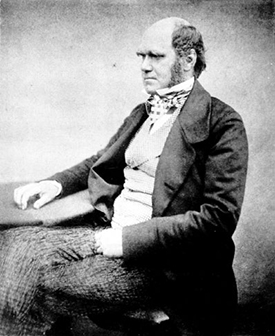
Charles Darwin, age 51 (Photo: Messrs. Maull and Fox, from book by Karl Pearson, Wikimedia Commons public domain)
PALMER: And also this whole question of whether or not man is one race or many races. “On the Origin of Species,” obviously suggests that ever-fitter, ever-fitter variations on any species are coming along, suggests that man is heading towards a more perfect being, and where do slaves or where do black people fit in that?
FULLER: That's the primary conversation that Darwin's book contributed to in the first year of its arrival in the US, and we often forget that, that in the 1840s a dominant scientific strain of thinking about human races had become prominent. The so-called “American ethnologists” argued that the various races had been created separately and in different places. The white race was the best that God had managed to do. Other races were sort of trial experimental efforts that hadn't gone quite as well as he had initially hoped, and of course this was enormously satisfying to the Southern slave powers. And Darwin enters into that debate by suggesting that all creatures, including human beings, share common ancestors and that, in point of fact, blacks and whites are not separate species or differently created humans but are, in fact, brothers and sisters.
PALMER: So, that's obviously gives an enormous goose to the anti-slavery forces because here is another child of God in chattel slavery.
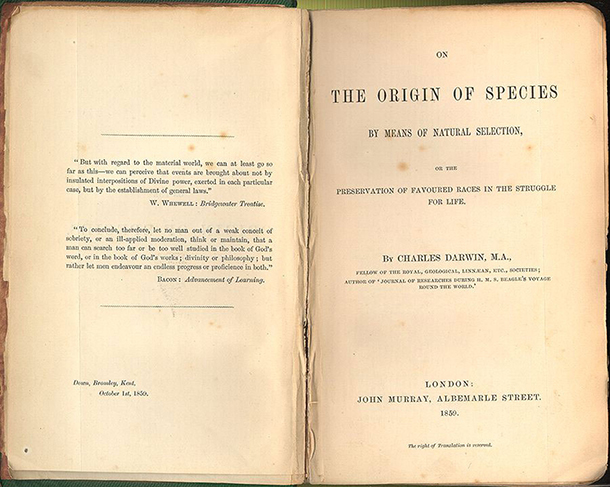
1859 edition of Darwin's Origin of Species. (Photo: Author unknown, Wikimedia Commons public domain)
FULLER: That's exactly right. So, my contention is that Darwin's book initially arrives in this country and really just spreads like wildfire. "On the Origin of Species" is published in the US a month after the British edition arrives, and it's described in all sorts of newspapers and periodicals within the first month or so. But the reason it has such widespread readership and interest had to do with the slavery question first and foremost.
PALMER: Now, it was Asa Gray that first brought Darwin to this country. Who was Asa Gray? And how was he important in spreading the ideas?
FULLER: Asa Gray was the first botanist at Harvard College, and he was a world-class, largely self-taught scientist who had been in correspondence with Charles Darwin throughout the 1850s. Darwin, he liked to ask Gray questions about botany because he himself was more of a zoologist, and throughout the 1850s Asa Gray provided loads of evidence and examples for Darwin, which eventually made their way into "On the Origin of Species."
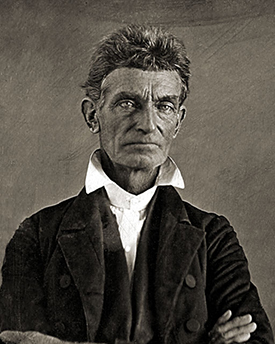
A daguerreotype of John Brown produced by John Bowles, c. 1856. (Photo: John Bowles, Boston Athenaeum public domain)
In the late 1850s, a little-known scientist named Alfred Russell Wallace on his own independently came up with the exact same theory of natural selection that Darwin had come up with, and Darwin was crestfallen and believed all of his work on the theory had been for naught until he remembered that he had told Asa Gray about the theory several years earlier. So he owed an enormous debt of gratitude to Gray, and to show that gratitude he sent Gray the first copy of "Origin of Species" to these shores, and Gray read it enthusiastically and takes it upon himself to become the American proselytizer of Darwin's theory, and in three essays in the summer of 1860, he argues for the legitimacy and the credibility of Darwin's work in the pages of "Atlantic Monthly."
PALMER: But another very famous Harvard luminary was very much not convinced about Darwin. Tell me about that. It’s Louis Agassiz.
FULLER: Louis Agassiz was the Professor of Zoology at Harvard College, and far and away the most well-known popular scientist of his day, and the foremost opponent of Darwinian theory in America in 1860. And the reason that he was so vehemently opposed to Darwin's theory is because he was also the strongest advocate for the theory of special and separate creation that I discussed earlier. He was a proponent that blacks and whites and other races had been created separately, just as he believed Monarch butterflies were created in specific environments. Darwin's theory threatened his own belief in special creation, and so he fought back vigorously.
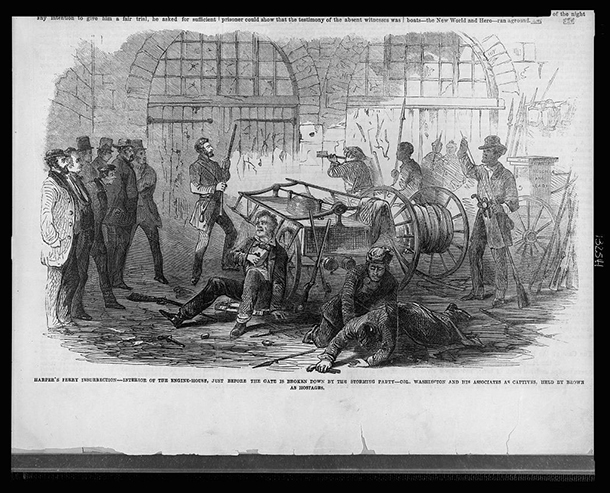
Depiction of the interior of the engine house during John Brown's raid, published in Frank Leslie's illustrated newspaper November 5th, 1859. (Photo: Frank Leslie's illustrated newspaper, v. 8, no. 205 (1859 Nov. 5), p. 359. [Public domain], via Wikimedia Commons)
PALMER: Now, it arrived quite soon in Concord, which was the home of Henry David Thoreau, among others, and there was a huge intellectual ferment going on anyway there. What was their reception of this book?
FULLER: So, it was mixed as Darwin's reception has been mixed to this very day. Ralph Waldo Emerson read it in a somewhat shallow way and saw the idea of evolution as progressive and developing always to something better and more majestic, and so he read Darwin as essentially a confirmation of his own theories of transcendental progress. Bronson Alcott, who was even arguably a greater idealist than Emerson, rejected Darwin outright, and his argument was that any theory that began with material processes and the physical was starting at the wrong end, that one had to begin with the divine spirit and work one's way down.
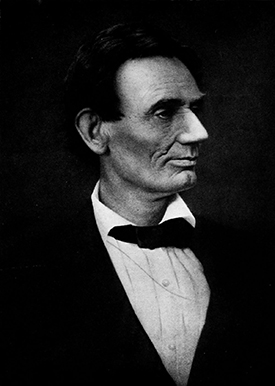
Abraham Lincoln, on June 3, 1860, two weeks after Lincoln’s nomination. (Photo: Alexander Hessler, Springfield, IL, Wikimedia Commons)
Only Henry David Thoreau of the transcendentalist cohort really grappled with Darwin's theory, in a way that was both supple, tough-minded, and ultimately, I think, synthetic. That is to say, he was able to combine his transcendental beliefs with Darwin’s materialism in a new kind of approach to nature.
PALMER: Were Darwin's theories actually widely accepted in the north? I mean, you've spoken about Agassiz being very opposed, but among the general population did they go down well?
FULLER: They were pretty quickly absorbed into the culture. We may not believe or think that, given the enormous difficulty the theory has in contemporary America, but by the late 1860s, less than a decade after the book arrived, Darwin's theories were taught in all colleges as credible theory.
PALMER: But you hardly mention the south. I mean, at this time, did these theories get down to the south, and how were they received there?
FULLER: Finding out how Darwin's theories were received in the south is a little trickier than in the north where we have access to diaries and journals of all of these major thinkers, but the reviews of the book, which appeared first in New England, almost immediately appeared in places like Richmond, Virginia, and New Orleans, and without the kind of resistance that you might think. They were usually reviews that reported upon this interesting new theory that proposed to explain the creation of new species.
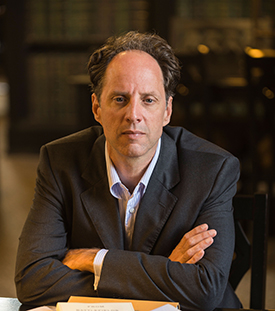
Author Randall Fuller. (Photo: Erik Campos)
PALMER: As I read this book, there seems to be more than a few parallels between what was happening then and what’s happening now. Do you think it has lessons for us?
FULLER: Well, I certainly think it does and particularly I think there's a cautionary tale about bending evidence or facts to a preconceived narrative or ideology, and this is why Thoreau is sort of a hero for me in the book because he tries not to do that to the best of his abilities.
CURWOOD: Randall Fuller’s new history is “The Book that Changed America.” He spoke with Living on Earth’s Helen Palmer.
Links
Living on Earth wants to hear from you!
Living on Earth
62 Calef Highway, Suite 212
Lee, NH 03861
Telephone: 617-287-4121
E-mail: comments@loe.org
Newsletter [Click here]
Donate to Living on Earth!
Living on Earth is an independent media program and relies entirely on contributions from listeners and institutions supporting public service. Please donate now to preserve an independent environmental voice.
NewsletterLiving on Earth offers a weekly delivery of the show's rundown to your mailbox. Sign up for our newsletter today!
 Sailors For The Sea: Be the change you want to sea.
Sailors For The Sea: Be the change you want to sea.
 The Grantham Foundation for the Protection of the Environment: Committed to protecting and improving the health of the global environment.
The Grantham Foundation for the Protection of the Environment: Committed to protecting and improving the health of the global environment.
 Contribute to Living on Earth and receive, as our gift to you, an archival print of one of Mark Seth Lender's extraordinary wildlife photographs. Follow the link to see Mark's current collection of photographs.
Contribute to Living on Earth and receive, as our gift to you, an archival print of one of Mark Seth Lender's extraordinary wildlife photographs. Follow the link to see Mark's current collection of photographs.
 Buy a signed copy of Mark Seth Lender's book Smeagull the Seagull & support Living on Earth
Buy a signed copy of Mark Seth Lender's book Smeagull the Seagull & support Living on Earth

